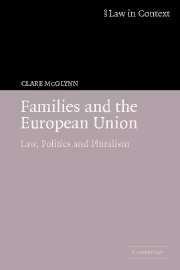Book contents
- Frontmatter
- Contents
- Preface
- Acknowledgments
- Table of cases
- Table of legislation and documents
- 1 Pluralism and human rights: a legal foundation for the regulation of families and family law in the European Union
- 2 Families, ideologies and value pluralism: towards an expanded concept of family
- 3 Children and European Union law: instrumentalism, protection and empowerment
- 4 Parenthood and European Union law: old ideologies and new ideals
- 5 European Union law and the regulation of intimate relationships: marriage, partnerships and human rights
- 6 The emergence of a European Union family law
- 7 Harmonisation, codification and the future of family law in the European Union
- Bibliography
- Index
4 - Parenthood and European Union law: old ideologies and new ideals
Published online by Cambridge University Press: 04 July 2009
- Frontmatter
- Contents
- Preface
- Acknowledgments
- Table of cases
- Table of legislation and documents
- 1 Pluralism and human rights: a legal foundation for the regulation of families and family law in the European Union
- 2 Families, ideologies and value pluralism: towards an expanded concept of family
- 3 Children and European Union law: instrumentalism, protection and empowerment
- 4 Parenthood and European Union law: old ideologies and new ideals
- 5 European Union law and the regulation of intimate relationships: marriage, partnerships and human rights
- 6 The emergence of a European Union family law
- 7 Harmonisation, codification and the future of family law in the European Union
- Bibliography
- Index
Summary
The concept of parenthood, the nature of parenting, even who is a parent, are all contested ideas. Many disciplines are grappling with changing realities in relation to parenting, attempting to map developments, contextualise them and examine their effects; the prospects for the future are analysed and prophecies made. In the context of European Union law, however, such rigorous and complex theoretical analyses are largely absent. Partly this is due to the limited competence of the Union to act in the controversial terrain of parenthood. Mostly, however, it is due to a fundamental theoretical failing, to an ignorance of the wider panoply of contexts and circumstances which affect parenthood today. Thus, to the extent that the concept of parenthood, and particularly ideas about motherhood, have come within the competence of Union law and before the Court of Justice, a remarkably narrow and traditional approach has been taken, premised on the ‘dominant ideology of the family’ discussed in chapter 2.
It is imperative that a reconsideration of this limited, atheoretical and apolitical approach to parenthood takes place. The Union must move away from a traditional ideology of motherhood and fatherhood. For law and policy to reproduce, legitimise and promote gender distinctiveness in parenting is to entrench existing patterns which are often discriminatory. The Union must embrace more modern approaches to parenting based on principles of gender neutrality.
- Type
- Chapter
- Information
- Families and the European UnionLaw, Politics and Pluralism, pp. 78 - 111Publisher: Cambridge University PressPrint publication year: 2006

